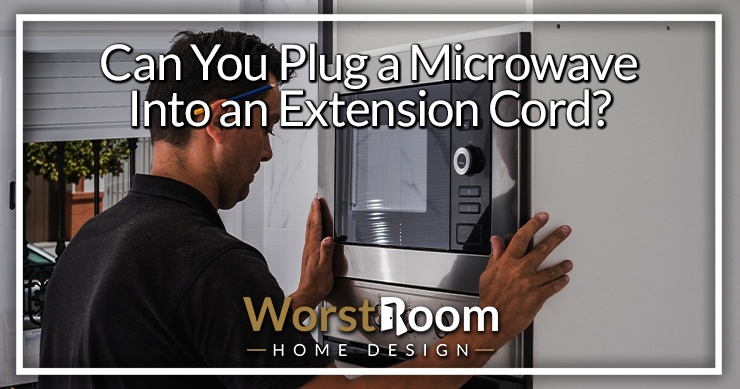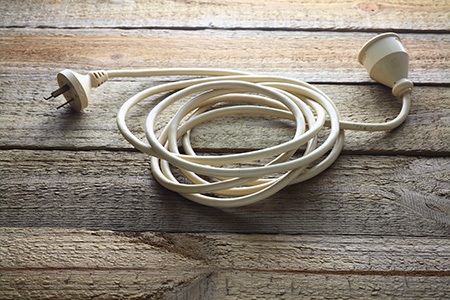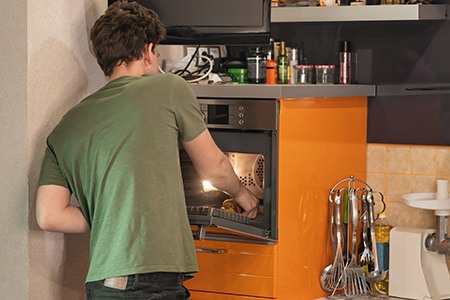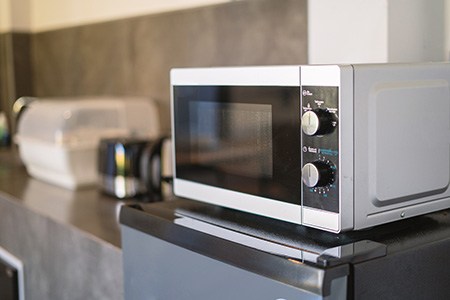Can You Plug a Microwave Into an Extension Cord?
Author: Omar Alonso | Editor: Omar Alonso
Review & Research: Jen Worst & Chris Miller

You've bought a new microwave and are excited to set it up in the kitchen. The problem is the nearest outlet to where you want to place it on the kitchen counter is too short for the plug to reach. Great, now what? You suddenly have the genius thought... but can you plug a microwave into an extension cord?
Is your idea safe? Or are you going to cause a disaster? You remember reading somewhere that it's not a good idea, but you can't remember why. Fortunately, this guide gives you all the answers.
Can You Plug a Microwave Into an Extension Cord?

A short answer? Yes. You can plug a microwave into an extension cord. However, there are a few caveats. If you don't have an outlet near the appliance, go ahead and use an extension cord to reach it. Before you do, you'll need to use a dedicated socket for the microwave. If you can't meet the requirements, then you should use microwave alternatives until you can.
The microwave draws a lot of current, and unsafe setup and operation of the unit could result in serious safety problems if you don't take the correct approach. Don't plug it into a socket with other appliances like the blender or refrigerator.
A dedicated circuit ensures you don't overload it with too much demand and wondering "where is the breaker box in my house" after tripping it otherwise. Then while the microwave is running, the circuit breaker won't reset or keeps tripping. It's a big sign that your breaker is working to keep you safe from your mistake.
Some homeowners think about using a socket multiplier to run the microwave and another appliance on the same outlet. These "bricks" have two or three outlets, allowing you to plug in several devices to the same outlet. Don't do this.
Socket safety is important, so don't use a socket multiplier to run the microwave and another appliance. If you want to expand the socket, use an extension. These usually come with several outlets on a brick, attached to a cord with a single plug.
The reason why it's safer to use these extension blocks is because many of them come with a built-in fuse, allowing you to stop overloads on the circuit. Ensure you buy an extension block with a safety rating and a fuse.
If you have to plug several appliances into the same outlet using the extension, don't plug in other devices requiring continuous operation, like the fridge or freezer. Rather plug in the blender or coffee machine – appliances you can use independently of the microwave.
What Gauge Extension Cord for a Microwave is Correct?

Read the operating manual for the microwave. You'll likely find a point under the safety section where the manufacturer recommends you don't use the microwave with an extension cord. That advice is there for a reason. But can a microwave be plugged into an extension cord despite this?
You're asking for trouble if you use an extension cord that isn't the right gauge or has a two-pin plug configuration. If the gauge of the wires in the extension cord is too thin, they can't handle the current demands of the machine, leading to overheating of the cables.
With extended use, the wires burn out, causing an electrical fire in the home. That's a quick way to burn down your house, and your insurance company might decide your actions were negligent when you go to process a claim.
It's best to use a 12-gauge extension cord with a three-prong plug to avoid this calamity. These cords are capable of handling electrical demands up to 15 amps, which is enough to operate the microwave safely. Keep the length of the extension cord under 9 feet – the shorter, the better. If you have a longer extension, trim it to size and ensure you secure all the connections correctly before plugging it in.
Never use a longer extension cord, and loop the excess cable together. This approach creates resistance in the cord, leading to overheating and a potential fire hazard. This goes for using extension cords with fridges and freezers, too.
Safety Concerns When Using a Microwave on an Extension Cord

Safe operation of the microwave is critical to ensure you don't start an electrical fire or burn out the outlet. The wiring in your home is expensive to replace if you have to call an electrician for the job. Correctly setting everything up is the best way to ensure safe operation and avoid disaster.
Operating the unit on a dedicated circuit with a 15 amp breaker ensures the safe operation of the microwave without the risk of burning out the wiring. Using a breaker with a lower amp rating risks melting the insulation around the wires, leading to an electrical fire.
Plugging too many appliances into the same circuit and simultaneously running them increases the risk of overloading the circuit. Most breakers will trip before they start a fire, but depending on the wiring age and the insulation quality, you still have the possibility of causing burnouts.
When you plug in the extension cord and start the microwave, disconnect the cord immediately if you notice a buzzing sound or a burning smell or if the microwave turns on when the door opens without you pressing buttons. Both of these occurrences point to potentially overloaded extension cords and the start of an electrical fire.
If the extension cord feels warm or hot, disconnect it immediately and don't use it again. If the cable feels warm, you're using the incorrect gauge wiring in the cord and need to step up the gauge. Don't use anything less than a 12-gauge wire to operate the appliance, especially if your microwave has a power rating of 1,000 watts or more.
Other warning signs that the extension cord is too low a gauge include inefficient operation of the appliance – you'll notice it takes longer than it should when cooking the food. Or the light inside the heating cabinet flickers, or the fan makes a strange noise.
Can you plug a microwave into an extension cord? Yes, and using the right gauge extension cord ensures you don't encounter any of these issues, giving you the safe operation of the appliance.
FAQs Regarding Microwave Extension Cords

When people ask “can you use an extension cord with a microwave” that means a whole slew of other questions are incoming because we all want to understand the topic completely. Let’s cover these questions now.
What’s the Correct Gauge & Length for Extension Cords for Microwaves?
We recommend using a minimum 12-gauge extension cord to run a microwave. Going lower to 14 gauge isn't a good option, especially for microwaves with power ratings over 1,450 watts. If you don't know the wattage of your microwave, check the backplate on the rear panel of the appliance, it should give you the wattage and amp rating.
If you're using a 14-gauge extension cord, it must have a rating of 1,450 watts and 13 amps or less. For short operations, such as cooking food for less than 10 minutes in the microwave, a 16-gauge extension cord might suffice, but we wouldn't suggest you risk it.
What’s the Relationship Between Microwave Wattage & Extension Cord Length?
The longer the extension cord, the lower the current supplied to the endpoint, i.e., the microwave. For instance, a 16-gauge extension cord under 50 feet can power a 1,625-watt microwave. If it's longer than 50 feet, the same 16-gauge cord can only power a 1,250W microwave. For safe operation, we don't recommend going over 9 feet in length for your extension cord.
Can You Plug the Microwave Into Any Outlet?
No. It's better to plug the microwave into a dedicated outlet without any other appliances operating off it simultaneously. However, if you have an 800-watt microwave or a lower rating than this, you might be able to get away with plugging it into the same circuit as other appliances, but we don't recommend it.
The National Electrical Code requires one circuit for running fixed equipment, including the microwave. If things go wrong and you're not operating the microwave per these guidelines, it might affect an insurance claim if you start an electrical fire.
The microwave should operate on a 120V or 240V outlet. Most microwaves have a 120V rating. Most US residences have 15A or 20A outlets that are safe for operating microwaves.
Can I Run a Fridge & Microwave on the Same Outlet or Extension Cord?
No. We recommend using both appliances on the same outlet, extension cord, or circuit. These appliances have high power demands. Plugging them both into the same outlet, circuit, or extension cord runs the risk of overload and the chances of starting an electrical fire.
If you have to plug in other appliances to the same outlet, ensure they don't require you to operate them simultaneously. For instance, plugging the blender and microwave into the same outlet is fine, but don't run them together simultaneously.
Key Takeaways for Using an Extension Cord With a Microwave

Let’s recap the main points from above with a quick summary:
- Microwaves draw a lot of power, and running them off an extension cord isn't a good idea if you can avoid it.
- If you must use an extension cord for your microwave, keep the cable length under 9 feet and use a 12-gauge extension cord.
- Operate the microwave on a dedicated circuit, and don't plug it into the same outlet as the fridge.
- Most US homes have a 15A to 20A outlet in the kitchen, which is safe for using a microwave, but plugging the fridge and microwave into the same outlet could overload the circuit and start an electrical fire.
- If you notice any buzzing sounds, the light in the cabinet flickering, or the cable feels hot, disconnect the microwave immediately.
The non-negotiable item is that the microwave needs to be on a dedicated circuit and outlet if it’s not a countertop model with lower wattage.
So, Can You Plug a Microwave Into an Extension Cord?
While avoiding extension cords and converters is always preferable, you can use the proper gauge and length extensions cord with a microwave as long as you don’t begin disregarding other rules such as running the microwave on a dedicated circuit unless it’s designed for that purpose. Can you plug a microwave into an extension cord? Yes, just read above to learn all you need about it.



